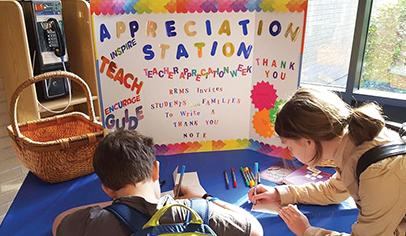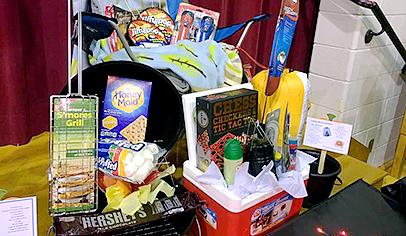The news is always shocking—a trusted treasurer or PTO president has embezzled thousands of dollars. It happens to groups of all sizes that have one common theme: Parents trusted each other, which made them vulnerable to theft.
Working together on fall carnivals and silent auctions is a bonding experience where parents form friendships. But these are also busy times when certain tasks, like handling money, are left to one seemingly trustworthy person. And that can be a costly mistake.
According to the Association of Certified Fraud Examiners, more than 85 percent of those who commit fraud have never before been charged with or convicted of a fraud-related offense. Many times the embezzler claims they only intended to borrow money to make it through a tough financial situation.
Of course, there will always be determined thieves who will forge a check or find another way to try to steal from you. The good news is there are financial controls and procedures you can put in place right now to help protect your group from all kinds of theft. Used together, the following strategies can help keep your funds safe.
Why People Embezzle Funds
Terrence Rice, a CPA in Milwaukee, follows embezzlement cases involving schools, churches, and other nonprofit organizations and posts his findings online. Typical theft cases in parent groups involve small amounts of money compared with embezzlement schemes at businesses, Rice says. Because of lax oversight procedures, it often takes members months, sometimes years, to notice the theft.
Volunteers are often shocked to learn that a seemingly trustworthy person stole from their group. Some say they only intended to borrow money from the group to make it through a difficult financial situation.
“In a lot of cases, a person is looking for quick funds, and the funds are right in front of them,” Rice says.
Run Your PTO Like a Business
When Lori Williams got involved with her school’s parent group, first as secretary and then as president, she never dreamed she would spend a summer matching receipts with bank statements. As she reviewed the group’s paperwork last summer, she kept returning to the same unthinkable conclusion: The treasurer, her close friend, was stealing. Under Williams’ leadership, the PTG at Acton (Maine) Elementary pressed charges against its treasurer, who allegedly stole about $27,000 over three years. The case is pending. Meanwhile, Williams and other board members revamped their policies and procedures to make sure their hard-earned fundraising dollars are never vulnerable again.
From the experience, Williams learned that a parent group has to be run like a business and that during meetings, friends must become colleagues. “Now, business is business,” Williams says. “And after our meeting we can all be friends again.”
Put Financial Oversight In Place
At John Tuck Elementary in Redmond, Ore., the PTO president liked to handle everything, including the money. The treasurer had no responsibilities, and no one questioned the president’s managing of the finances.
When Lauren Wanamaker was the PTO’s vice president, the treasurer discovered the president had been stealing. The organization worked with police, and the president was indicted by a grand jury, eventually pleading guilty to two felony counts of theft. She was sentenced to community service and forced to pay restitution. The group pressed charges and received a negotiated amount, $10,000 of the $12,000 she stole.
The PTO worked hard to change its procedures, making sure financial oversight became a shared responsibility. Members regained community trust by holding successful events. Initially, they shied away from fundraising, “We didn’t feel right asking for money,” says Wanamaker, who assumed the role of president. But after receiving restitution, they started raising money again.
After Embezzlement, Work To Rebuild Trust
For groups that have been victims of theft, there is often satisfaction in rebuilding. The ordeal at John Tuck Elementary produced tears, sleepless nights, and disbelief. But it also resulted in much-needed changes in how the group operated. “We have turned the group around, and we are better off than we have ever been,” Wanamaker says. “We grew close through the experience, and it made me feel so strongly about being involved and how important it is.”
At Acton Elementary, Williams discovered the theft when the PTG was ready to buy a long-awaited piece of playground equipment. There wasn’t enough money in the account to cover the purchase. Almost a year later, the pain of the betrayal was eased when the playground got its new centerpiece, a fire truck structure equipped with a bell. During a ceremony in May, the truck was dedicated in memory of a superintendent who was a volunteer firefighter. His name and number were emblazoned on the truck.
“There wasn’t a dry eye,” Williams says. “It was great for us as the PTG because it showed we can still do good things as long as we stay positive.”
14 Tips For Safeguarding Your Money
The key to preventing theft is to put in as many controls as possible to ensure that several people are always watching the money. A person intent on stealing will find a way around most preventive measures, Rice says. For example, just requiring two signatures on checks isn’t enough. “A thief will just forge the second signature,” he says. “Thieves will make checks out to themselves.”
The following strategies from Rice and from parent groups that have rebounded from theft can help prevent embezzlement.
Be cautious with credit and debit cards. Allow only one or two officers access to cards. That makes it easier to keep track of who's spending what, and it lessens temptation.
Require reimbursement forms. Create a reimbursement form requiring two signatures. Require everyone seeking reimbursement to provide all receipts. When the treasurer makes the payment, attach a copy of the check. No one wants the hassle of reimbursement forms, but it’s the best way to keep track of spending. As a bonus, many people spend less when they must initially use their own money.
Don’t have a petty cash fund. Rice doesn’t like petty cash drawers because they invite petty theft. Once a parent gets used to stealing a few dollars, he might be emboldened to steal greater sums.
Require two signatures on checks. It isn’t a thief-proof practice, but it is standard protocol for keeping close tabs on spending. At Acton Elementary, the treasurer maintains the checkbook but does not sign checks. Two other leaders must sign them.
Review bank statements at board meetings. At John Tuck Elementary, the president concealed her theft by giving verbal financial reports at meetings rather than handing out bank statements. The treasurer should make a formal financial report at every meeting. Leaders should then initial the bank statements.
Enlist someone other than the president and treasurer to receive mailed statements. At John Tuck Elementary, this control was put in place to give yet another board member access to bank statements.
Count money from events as a group. After an event, everyone is tired and wants to go home, but a few parent group leaders need to stay and count the cash. Record the amount on a form, and have everyone initial the amount.
Deposit money from events right away. Don’t let the treasurer or anyone else wait several days after an event to deposit the proceeds. Another board member should verify that the deposit was made by asking for the deposit slip or by viewing transactions online. As the saying goes: Trust but verify.
Look for opportunities to separate duties. In many cases of theft, one person enjoyed sole access to bank accounts. The more ways a group can divide up responsibilities, the more checks and balances it will have to prevent fraud.
Be organized. Keep financial records in order. “I’m not organized at home, but PTG has to be organized, with receipts for every purchase,” Williams says. Software programs such as PTO Today’s Finance Manager can help your treasurer track transactions and make your group’s finances more transparent.
Review your records annually. It’s important to review your group’s finances on a regular basis, whether this is done by a parent committee or in a professional audit. A CPA in your parent community might be willing to audit your books for free. “Pay for it if you have to; it’s worth it,” says Williams, whose PTG will now have an audit done by a CPA every other year.
Put all your new policies in writing. Update your group’s bylaws to ensure continuity as new leaders come on board.
Be consistent. Some presidents are uncomfortable looking over the treasurer’s shoulder. They don’t want the treasurer to think she isn’t trusted. By treating everyone the same, you let the treasurer know it isn’t personal. It’s just good business.
Stay focused on your mission. Another change Acton Elementary made after the theft: “We start off every meeting with our mission statement,” says Williams. “We’re not just here to raise funds. We have a broader purpose.”
What To Do if You Suspect Theft
If you suspect that someone may be stealing from your parent group, it’s important to take steps to resolve the issue, as painful as those steps might be.
The first red flag that an officer is stealing is often the officer’s refusal to provide bank statements. Others include bank balances that appear low with no credible explanation and an officer’s refusal to share passwords for online access to bank accounts.
If you see a red flag, even one, it’s time to take action. These recommendations come from the Association of Certified Fraud Examiners and are designed to protect your parent group and make sure you don’t compromise any potential criminal case.
Get help from your school board’s attorney and an outside source such as a CPA with fraud experience or a certified fraud examiner. If an investigation is warranted, says Allan Bachman, education manager of the Association of Certified Fraud Examiners, it should be conducted by a trained professional and not by parent group members with no training in such matters.
Resist the temptation to confront the parent. If you try to handle the matter internally, you could put yourself and your parent group at risk for liability.
Following your attorney’s guidance, contact the authorities. This may be an agonizing decision, and it should be made based on the evidence and the advice of counsel, not your personal relationship with the person you suspect.
Cooperate with the authorities. Provide the documentation they ask for, and answer all questions as completely as possible. The police will review evidence, question the parent, and determine whether the parent should be arrested and charged. If police decline to pursue the case, your attorney can advise you on the feasibility of a civil suit.
When communicating with the community, focus on the steps you are taking to recover the money and prevent theft. Do not comment on past actions, including the alleged theft and any current or pending charges, unless the person has been convicted.
Don’t talk about it publicly. Refer media inquiries to your attorney.
Keep your group functioning as normally as possible. It takes time to recover from a breach of trust. The best way forward as a group is to keep focusing on your accomplishments and the great work you do for your school.
Originally posted in 2011 and updated regularly.

























